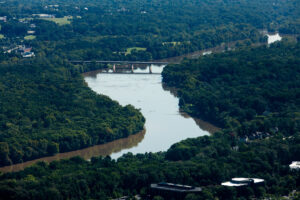
Richmond, Va. — In an important step toward reducing sewage pollution to the James River and its tributaries, the Environmental Integrity Project and partner conservation groups have finalized a settlement agreement with Henrico County, Virginia, to reduce violations at the county’s Water Reclamation Facility and the system of pipes, known as the collection system, that send sewage to that plant.
The settlement agreement requires Henrico County, near Richmond, to invest $1 million in an environmental project that will reduce pollution and benefit Henrico residents. The county will also take numerous other actions to address sewage pollution and protect the health of Henrico residents, including substantially improving notification of sewage overflows near where people live, work, and play.
“The James River is such an historic and iconic waterway, it is great news that this settlement agreement will help reduce sewage overflows that pose a public health threat to kayakers and anglers,” said Jen Duggan, Deputy Director of the Environmental Integrity Project, which represented the James River Association in the lawsuit. “Henrico County’s new public notification system, improved inspections, and wastewater filters – among other steps – will all help the cause of a healthy and restored James River.”
This agreement is the result of concerns raised by the Chesapeake Bay Foundation (CBF), James River Association (JRA), and the Environmental Integrity Project (EIP) about decades of water pollution violations by Henrico County’s sewage collection system and treatment plant. In December 2021, the three organizations filed a lawsuit related to these violations in the U.S. District Court for the Eastern District of Virginia.
The court dismissed the case on Feb. 28 after the conservation groups filed a motion to dismiss because the parties had signed the settlement agreement. In addition to the $1 million investment in environmental restoration, Henrico County agreed to modifications of its consent order with Virginia’s Department of Environmental Quality, which now requires Henrico County to:
- Notify the public of sewage overflows from its collection system into waterways through a web-based map that is updated daily, and public outreach through door hangers and bill inserts;
- Accelerate construction of new filters at its wastewater treatment plant;
- Ramp up sewer inspections, including through video inspections of sewer pipes and smoke testing;
- Launch a problem sewer cleaning program;
- Consider a program to address sewage overflows originating on private property; and
- Take into account the effects of heavier rainfalls due to climate change on Henrico’s sewage system.
The 34-year-old Henrico County Water Reclamation Facility and its connected collection system have been subject to at least 40 violation notices and five different state consent orders since it began its operation in 1989. Raw sewage released into the James River related to these violations has posed a threat to the environment and the health of people who spend time on the water.
“This legally enforceable agreement ensures that the public will be better informed and protected from sewage spills and pollution violations,” said James River Association CEO Bill Street. “Additionally, we are pleased that all parties involved were able to reach agreement on projects that will benefit the James River and consider climate change impacts in future plans
Chesapeake Bay Foundation (CBF) Virginia Executive Director Peggy Sanner said: “This settlement is a big win for Henrico County residents, who will now benefit from a $1 million investment in environmental restoration to reduce pollution, better access to timely information on sewage overflows, and many other measures that will protect residents and the James River for years to come. Achieving these goals was the result of dedicated work by all participating entities, including the County of Henrico, CBF, JRA, and EIP.”
Media Contacts:
Tom Pelton, Environmental Integrity Project (443) 510-2574 or tpelton@environmentalintegrity.org;
Kenny Fletcher, Chesapeake Bay Foundation, 804-258-1628 or kfletcher@cbf.org
Erin Hillert, James River Association, (608) 239-2644 or ehillert@thejamesriver.org


